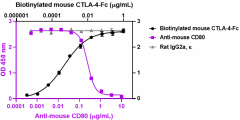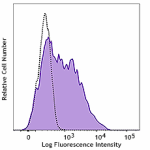- Clone
- W17200C (See other available formats)
- Regulatory Status
- RUO
- Other Names
- B-Lymphocyte activation antigen B7.1, CD80, Ly53, TSA1, CD28 ligand (CD28L), MIC17
- Isotype
- Rat IgG2a, κ
- Ave. Rating
- Submit a Review
- Product Citations
- publications

-

Biotinylated recombinant mouse CTLA-4-Fc Chimera (Cat. No. 779106) (black circles) binds to immobilized recombinant mouse B7.1 (CD80)-Fc Chimera (Cat. No. 555406). Ultra-LEAF™ purified anti-mouse CD80 (clone W17200C) (purple squares) inhibits the binding in a dose-dependent manner, whereas the GoInVivo™ purified rat IgG2a, κ isotype control (Cat. No. 400562) (gray triangles) does not have the effect. This antibody blocks the binding of 0.04 µg/mL biotinylated recombinant mouse CTLA-4-Fc Chimera to 1 µg/mL immobilized recombinant mouse B7.1 (CD80)-Fc Chimera. ND50 = 0.15 - 0.6 µg/mL -

C57BL/6 mouse splenocytes were stimulated with LPS for 3 days. Cells were stained with purified anti-mouse CD80 (clone W17200C, filled histogram) or Rat IgG2a, κ isotype control (open histogram), followed by goat anti-Rat IgG FITC
| Cat # | Size | Price | Save |
|---|---|---|---|
| 600053 | 100 µg | ¥35,690 | |
| 600054 | 1 mg | ¥118,690 |
The B7 family of proteins are structurally related, cell membrane-associated molecules that regulate immune responses by delivering costimulatory or coinhibitory signals via their ligands. So far, eight family members have been identified, including B7.1 (CD80), B7.2, B7-H1, B7-H2, B7-H4, B7-H6, PD-L1, and PD-L2. These proteins are mainly expressed by activated antigen presenting cells (APCs) and when paired with either CD28 or CTLA-4 on a T lymphocyte, they induce an increase or decrease in the downstream signaling activity of the MHC-TCR interaction between APCs and T cells. B7.1 has been shown to bind both CTLA-4 and CD28. However, it has a 20-fold higher affinity to CTLA-4 than to CD28. Despite their structural similarities, the individual contribution of B7.1 and B7.2 to the development of pathogenic T cells in autoimmune diseases and protective T cells in infectious diseases is markedly distinct. Besides regulating T cell immune responses, B7 also plays a role in anti-tumor immunity. This is confirmed by demostrating that cytotoxic T cells were able to eradicate tumor cells transfected with B7.1 and B7.2. After activation, follicular lymphoma was shown to upregulate B7.1 and other costimulatory and adhesion molecules, therefore increasing APC activity and amplifying primed T cell responses. Homozygous null B7.1/B7.2 mice fail to generate antigen specific IgG1 and IgG2a responses, suggesting that B7 proteins are important in Ig immune responses. Mouse and human B7.1 share 44% amino acid identity.
Product DetailsProduct Details
- Verified Reactivity
- Mouse
- Antibody Type
- Monoclonal
- Host Species
- Rat
- Immunogen
- Recombinant mouse B7.1 (CD80)-Fc Chimera
- Formulation
- 0.2 µm filtered in phosphate-buffered solution, pH 7.2, containing no preservative.
- Endotoxin Level
- Less than 0.01 EU/µg of the protein (< 0.001 ng/µg of the protein) as determined by the LAL test.
- Preparation
- The Ultra-LEAF™ (Low Endotoxin, Azide-Free) antibody was purified by affinity chromatography.
- Concentration
- The antibody is bottled at the concentration indicated on the vial, typically between 2 mg/mL and 3 mg/mL. Older lots may have also been bottled at 1 mg/mL. To obtain lot-specific concentration and expiration, please enter the lot number in our Certificate of Analysis online tool.
- Storage & Handling
- The antibody solution should be stored undiluted between 2°C and 8°C. This Ultra-LEAF™ solution contains no preservative; handle under aseptic conditions.
- Application
-
Block - Quality tested
FC - Verified - Recommended Usage
-
Each lot of this antibody is quality control tested by blocking the binding of 0.04 µg/mL biotinylated recombinant mouse CTLA-4-Fc Chimera (Cat. No. 779106) to 1 µg/mL immobilized mouse B7.1 (CD80)-Fc Chimera (Cat. No. 555406). ND50 = 0.15 – 0.6 µg/mL. For flow cytometric staining, the suggested use of this reagent is ≤ 0.25 µg per million cells in 100 µL volume. It is recommended that the reagent be titrated for optimal performance for each application.
- RRID
-
AB_2910468 (BioLegend Cat. No. 600053)
AB_2910468 (BioLegend Cat. No. 600054)
Antigen Details
- Structure
- Homodimer
- Distribution
-
Activated B cells, monocytes, macrophages, dendritic cells
- Function
- Plays a role in T cell activation; CD80 and CD86 play an important role in T cell priming
- Interaction
- T cells
- Ligand/Receptor
- CD28, CTLA-4
- Cell Type
- B cells, Dendritic cells, Macrophages, T cells, Tregs
- Biology Area
- Cell Biology, Costimulatory Molecules, Immunology, Neuroscience, Neuroscience Cell Markers
- Molecular Family
- CD Molecules, Immune Checkpoint Receptors
- Antigen References
-
- Freeman GJ, et al. 1993. Science. 262:909-11.
- Azuma M, et al. 1993. Nature. 366:76-9.
- Gimmi CD, et al. 1991. Proc Natl Acad Sci USA. 88:6575-9.
- Linsley PS, et al. 1991. J Exp Med. 173:721-30.
- Greaves P and Gribben JG. 2013. Blood. 121: 734-44.
- Czuczman MS, et al. 2005. J Clin Oncol. 23:4390-8.
- Gene ID
- 12519 View all products for this Gene ID
- UniProt
- View information about CD80 on UniProt.org
Related FAQs
- Do you guarantee that your antibodies are totally pathogen free?
-
BioLegend does not test for pathogens in-house aside from the GoInVivo™ product line. However, upon request, this can be tested on a custom basis with an outside, independent laboratory.
- Does BioLegend test each Ultra-LEAF™ antibody by functional assay?
-
No, BioLegend does not test Ultra-LEAF™ antibodies by functional assays unless otherwise indicated. Due to the possible complexities and variations of uses of biofunctional antibodies in different assays and because of the large product portfolio, BioLegend does not currently perform functional assays as a routine QC for the antibodies. However, we do provide references in which the antibodies were used for functional assays and we do perform QC to verify the specificity and quality of the antibody based on our strict specification criteria.
- Does BioLegend test each Ultra-LEAF™ antibody for potential pathogens?
-
No, BioLegend does not test for pathogens in-house unless otherwise indicated. However, we can recommend an outside vendor to perform this testing as needed.
- Have you tested this Ultra-LEAF™ antibody for in vivo or in vitro applications?
-
We don't test our antibodies for in vivo or in vitro applications unless otherwise indicated. Depending on the product, the TDS may describe literature supporting usage of a particular product for bioassay. It may be best to further consult the literature to find clone specific information.
Other Formats
View All CD80 Reagents Request Custom Conjugation| Description | Clone | Applications |
|---|---|---|
| Ultra-LEAF™ Purified anti-mouse CD80 | W17200C | Block,FC |
| PE anti-mouse CD80 Antibody | W17200C | FC |
Compare Data Across All Formats
This data display is provided for general comparisons between formats.
Your actual data may vary due to variations in samples, target cells, instruments and their settings, staining conditions, and other factors.
If you need assistance with selecting the best format contact our expert technical support team.
-
Ultra-LEAF™ Purified anti-mouse CD80

Biotinylated recombinant mouse CTLA-4-Fc Chimera (Cat. No. 7... 
C57BL/6 mouse splenocytes were stimulated with LPS for 3 day... -
PE anti-mouse CD80 Antibody

LPS-stimulated (3 days) C57BL/6 mouse splenocytes were stain...









Follow Us